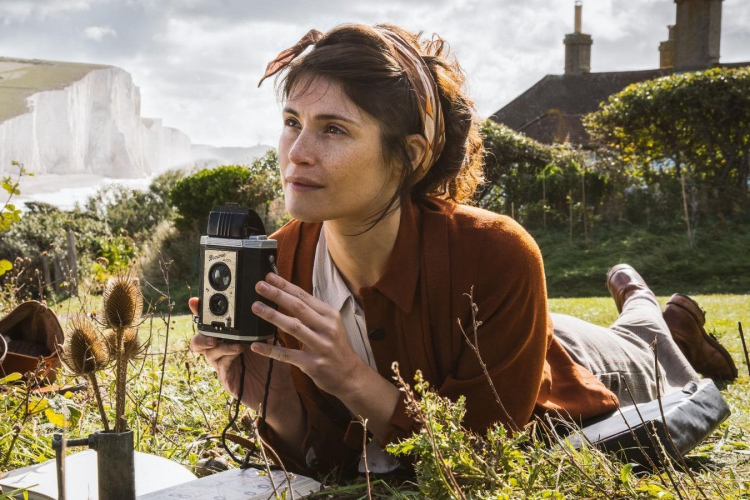Hollywood too often tells a familiar history of World War II. War stories are mostly reserved for heroic tales of the men behind some of the world’s greatest combat missions to defeat Adolf Hitler and establish support for the Allies. Rarely exploring the expansive experiences of women and minorities at the time, a few films are turning the tide of how cinema recollects history. In the similar vein of Lone Scherfig’s Their Finest or Mike Newell’s The Guernsey Literary and Potato Peel Pie Society, Summerland makes for a refreshing escape of self-discovery and fantasy during one of the world’s darkest periods.
Set in the English coastal countryside of Kent, academic researcher Alice Lamb (Gemma Arterton) becomes the guardian of a refuge child Frank (Lucas Bond) whose parents are fighting in the war. Despite the nearby town treating her as the “beast on the beach” for her unladylike behavior, Lamb and Frank develop an unlikely connection that helps unveil a lost romance with a former lover (Gugu Mbatha-Raw). As research about a fantastical island in the sky brings her closer to Frank, their time together draws more parallels between them than they ever could’ve imagined.
Opening a film with an irascible character is not the smoothest introduction. It can easily set the audience apart from the protagonist and connect them to the story. In the beginning, Lamb gives us every reason to side with the villagers’ caution as she impatiently treats everyone in her vicinity with a gruff disdain. Portrayed by Gemma Arterton, though, she offers a compelling depth to Lamb’s identity as a reclusive queer woman that precedes her reputation. She's not too cold to turn viewers off from knowing what makes her tick. It helps that for both her character and the audience, she’s aided by Bond's heartwarming charm. The young adult actor portrays Frank with a maturity that makes him compatible to challenge Lamb’s disagreeable behavior, a curiosity that helps Alice open up about her workaholism, and an innocence to remind us of his own misplacement away from his parents during the war. Together, their chemistry draws you in from beginning to end.
In her feature film debut, theatre director and Olivier award winning playwright Jessica Swale brings her stage experience to the big screen. Arguably, the film’s strongest love story is between Lamb and Frank who are able to develop their familial dynamics through the highs of Lamb's work and the lows of the war effort. The first half of the film builds subtly on the nuance between Lamb and Frank – what makes them connect over her work, how Frank adjusts to life in school, and the past of both characters that made them arrive to where they are now.
Swale competently knows how to frame their relationship against the war and use it to her characters' advantage with tenderness and honesty. Where the film might writes off more than it can tie together is in the second half. As the film moves into the third act, the plot becomes more melodramatic as it races to further bridge Lamb’s connection to Vera. Throughout the film, their love affair is mostly unveiled in brief flashbacks, hinting at nods of their affection and how they drifted apart. As lovingly played as Gugu Mbatha-Raw embraces the role, Vera comes across more as a madcap muse instead of a full-fleshed figure. There’s an attempt to address her identity and what it means to be a Black lesbian during the 40s and how that would affect her future, but it plays too much like a backdrop - which can feel heartwarming and fitting as well as contrived by the film's ending. While Lamb and Vera’s romance is a great step in LGBTQ+ representation, there is a question if the film doesn't reach far enough or reaches too far to make the story come full circle.
More than the conventional wartime flick we so often see, the film is ultimately a sweeping and earnest story of love and adventure. The legitimacy of how the film handles Alice’s story almost makes it feel like a biopic more than a slice of fiction. (I, legitimately, looked up if I could read her novel of Summerland and was disappointed when it turns out not to be real. Oh, to dream.) A deserving credit for the film's smooth exploration goes to Swale’s direction and script, but also the production design. Not only is Lamb’s seaside cottage the stuff dreams are made of for aspiring writers, but Claire Finlay-Thompson’s Lands Girl-esque costume design introduces a new style of femininity and queer identity not often represented on-screen. The atmosphere crafted by Lamb and her production crew offers a beautiful mix of picturesque fantasy and realistic portrayal of the early 20th century that doesn't come along in the war genre too rarely.
Even if Swale’s plot takes a few sketchy turns in its development, her sturdy eye and control as a director is what keeps Summerland on-track. Though the film has a strong first half, and struggles in the second, the character development and their story is satisfying enough to not deter from the film’s limited missteps. With a great cast in tow mainly with Arterton, Bond, and Mbatha-Raw, Swale’s film is a female-centric piece of the puzzle that’s been missing for too long.
Rating: ★★☆
Please Note: I was provided with a screener to watch this film and provide an honest review. Summerland is available to Stream or Download iTunes, Amazon, GooglePlay, YouTube, Vudu.


No comments:
Post a Comment